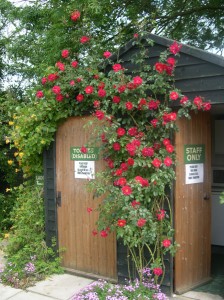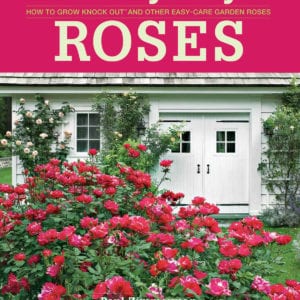I realize we’re about to wade into a minefield here. There are many different opinions about spraying for disease, and we’re not going to say this one is better than that one. We are just going to tell you what works for us with Garden Roses. Take this information, couple it with your own Gardener’s Instincts and then do what works for you.
We advise you take our thoughts and adapt them to your garden and climate. There is no “one program fits all” way of doing it.
First off, any disease prevention program starts with selecting disease resistant garden roses. We talk about that in “Buying & Planting Garden Roses” in the Getting Started section. Suffice to say, ask for recommendations from people who grow roses in your area as not all roses do well in all parts of the country.
The next part of good disease resistance is a healthy plant. Healthy plants develop better immune systems just like healthy people. This starts with good soil including mulching and organics. Check out our sections on “Preparing The Soil“, “Feeding” and “Mulching” for some tips. Also “Your Garden Rose’s First Year” has a video which helps you get your rose off to a great start.
The healthier your roses are the better able they are to fend off disease on their own
Now, let’s talk about spraying – or not spraying which is what we advise and do. Here is why. Roses have natural fungi on their leaves that help ward off diseases. But when you spray for bad fungus, like blackspot, you also harm the good fungi that help the rose ward off diseases like blackspot. Kind of like throwing out the baby with the baby water!
Additionally, as roses mature they develop their own immunities to the local strains of disease. Like children, when they are young they catch every bug around. But when they get older and are exposed to those bugs they develop their own immunities. It’s the same with roses.
Good Garden Roses when left to their own devices will build up immunities and ward off diseases on their own.
We advise you don’t spray unless you get a horrendous outbreak and the roses are in danger of dying or being severely harmed. But spray to get rid of the disease and then stop spraying. Treat the problem once and then leave the roses alone.
I realize not spraying doesn’t seem the best way to keep disease off your roses, but over the fifteen years we’ve been growing roses that’s what we’ve done. We know personally it works and more and more rose growers are telling us it works for them. It takes about two seasons for the roses to settle in so expect some disease when they are young.
Follow these simple steps, be brave when your roses “catch a cold” and realize in the end as they fight it off themselves it’s for the best!
Here are a few rules of thumb:
- Start by selecting good Garden Roses for your area. Ask around for recommendations on forums, local rose societies, garden societies etc.
- Keep your rose healthy via good soil and organics. Healthy roses are more disease resistant.
- Keep your spraying to a minimum – if at all. Good Garden Roses left un-sprayed build up their own immune systems over time.
For further information:
- Please see our article “Just Say No To Chemicals“


